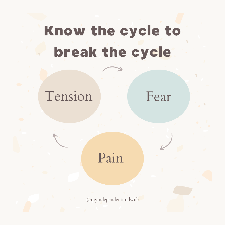What is Oxytocin?
Oxytocin is also known as the love hormone, which is why it’s released during sex, orgasm, birth and breastfeeding. Its main function in labour is to bring on strong, powerful and effective contractions.
Oxytocin reduces stress, calms you down and helps with pain during labour. Impressively, your baby will also produce oxytocin before and during labour.
You’ll get a surge of oxytocin in the final stage, so if you’re having a vaginal birth it will help you along with pushing.
Oxytocin hangs around after birth too, helping you feel more relaxed, well-nourished and bonded with your baby. It helps with the let-down reflex during breastfeeding and protects you against postpartum haemorrhage.
1. Know your hormones – If Oxytocin is the accelerator in labour, then adrenaline is the break. Adrenaline inhibits Oxytocin production, as it is the hormones that are part of your ‘fight or flight response. When adrenaline is released, your body presumes that it is not safe to continue in labour and oxytocin levels will fall. Reducing anything that increases your adrenaline levels will allow the Oxytocin levels to flow.
2. Know the cycle to break the cycle – During labour, there is a 3 part cycle that is known to increase adrenaline and pain:
Use the following 8 tips to break the cycle and improve your Oxytocin levels
3. Darkroom – Oxytocin is a shy hormone that prefers dark, quiet and small spaces. Drop the lights, put on some ambient, relaxing music and make your birthing space as cosy as you can. If you are being induced, or in an environment, you can’t control as well, try an eye mask and headphones.
4. Controlled breathing - Focus on your breath and take deep, slow steady, deliberate breaths to help encourage the flow of oxytocin. Rapid breathing, or hyperventilating, increases adrenaline levels and reduces oxygen exchange with your baby.
5. Visualisations – There is a huge amount of research that shows when we visualise successful situations in our minds over and over again, we are much more likely to achieve them. Visualising your baby being born in the manner you have planned or imagining holding them after birth gives you a positive goal to work towards and keeps you focused on what you are working so hard for.
6. Positive affirmations - Positive affirmations are an intentional form of self-talk in which you tell yourself supportive, encouraging things. They help disrupt negative thought patterns, boost self-compassion and motivate desired behaviours. Repeatedly saying these phrases builds new neural pathways in your brain, which strengthens positive thought patterns.
7. Hypnobirthing - Use hypnobirthing techniques to relax your mind and body. Hypnobirthing utilises a powerful combination of controlled breathing techniques, visualisations, music and positive affirmation that can be practised at home ready for labour. Hypnobirthing is also very adaptable to any birth situation, so whether you plan a home birth or elective c/s, it will improve your feeling of control and improve your birthing experience.
8. Eye contact - Make eye contact with your birthing partner, or whoever is supporting you during labour. This gives you a fixed point to focus on during contractions and aids bonding which helps to increase the flow of oxytocin.
9. Gentle touch – Again there is an enormous wealth of research showing the power of touch in reducing adrenaline levels. This is why skin to skin with babies is so effective at stabilising their little systems immediately after birth. Birth partners can gently massage your hands, back, or feet during labour to encourage the release of oxytocin. Combining this with aromatherapy oils such as lavender and frankincense has also been well researched to reduce the length of labour and pain too – bonus!
10. Continuity of carer – Knowing who will be with you in labour, that they understand you and your unique circumstances in which you approach labour will reduce adrenaline and improve your oxytocin levels. An independent Midwife can ensure that you are as prepared for birth as possible, and be on-call to attend 24/7 so you know who will be there on the big day. Evidence shows that having the same Midwife throughout your care reduces the length of labour and the amount of pain relief you may opt for.
If you live in the NorthWest of England and are interested in Private Maternity care or Hypnobirthing, please contact us on:
birth@myindependentmidwife.co.uk
www.myindependentmidwife.co.uk
@myindependentmidwife
